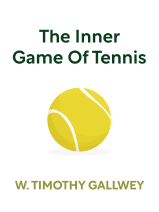

This article is an excerpt from the Shortform book guide to "The Inner Game of Tennis" by W. Timothy Gallwey. Shortform has the world's best summaries and analyses of books you should be reading.
Like this article? Sign up for a free trial here .
Are there reasons why sports are good for kids? How can kids benefit from learning competitiveness at an early age?
Kids have long been involved in sports. In addition to keeping kids occupied and healthy, there are other reasons why sports are good for kids, including that it teaches mental strength.
Keep reading for some of the reasons why sports are good for kids.
Competition and Fitness: Why Sports Are Good for Kids
Once we find out what game we are playing, we have to figure out what winning means to us. What’s most important is to disentangle winning and losing from our understanding of our self-worth. The worst kind of competition is usually when the participants are using it to derive their self-worth.
There are two contradicting views on competition in the West: Some believe it is responsible for society’s success, others that it is divisive and responsible for failure.
- Many children are brought up believing the former, and so every point becomes life or death. These children often turn into adults who want to succeed so much that they lose sight of everything else.
- Others rebel, pointing out the cruelty in this sort of society. In young people, this can manifest in a wish to fail. They don’t care that they lost because, according to them, they didn’t try. But even in this case, there’s an understanding that if they did try and lose, that would be a measure of their self-worth.
If we don’t use competition to derive our self-worth, though, what kind of meaning should we be finding in competition and winning? And how can playing better help us in the broader scheme of our mental health?
This question is a difficult one—after managing to decouple competition and his self-worth, Gallwey himself had trouble finding motivation to compete.
To begin to answer this complex question, find the value in challenges and overcoming obstacles. The most accomplished someone can feel is when they have successfully used all of the skill, concentration, and general capability at their disposal.
Winning is only valuable if it helps you achieve a meaningful goal. Find goals that force you to exert yourself, mentally or physically, and then attempt to overcome the obstacles necessary to get there.
Leaving Attachments Behind
Most stress in modern life is caused by attachment—Self 1 becomes so dependent on a job, a relationship, or an idea that when change does come it’s threatening. Freedom from this stress is the recognition that we will be alright if we lose one of these things, so long as we continue to be able to live fairly comfortably.
Here, it’s important to distinguish between what Self 2 needs to operate well and what Self 1 has internalized as a need. A lot of demands that you place on yourself are derived not necessarily from what you need but from what you’ve been told somewhere along the way that you need.
There’s a distinct difference between this and “self-improvement”—everyone’s Self 2 is fine as it is, we just need to listen to it.
After all of this, readers may still be questioning what it means to win the Inner Game. The response is essentially impossible to give, although the question is important. It’s impossible to give because the moment that we give an answer, Self 1 will see a goal that can be conquered. This will add to our stress. The only way to “win” is for your Self 2 to be the only Self that knows when you’re conquering the Inner Game.
These are all reasons why sports are good for kids. Learning these lessons early can help kids succeed.

———End of Preview———
Like what you just read? Read the rest of the world's best book summary and analysis of W. Timothy Gallwey's "The Inner Game of Tennis" at Shortform .
Here's what you'll find in our full The Inner Game of Tennis summary :
- Why tennis is actually a mind game
- How to quiet the mind and concentrate intently
- Why your self-worth shouldn't be dependent on how you do in competition






